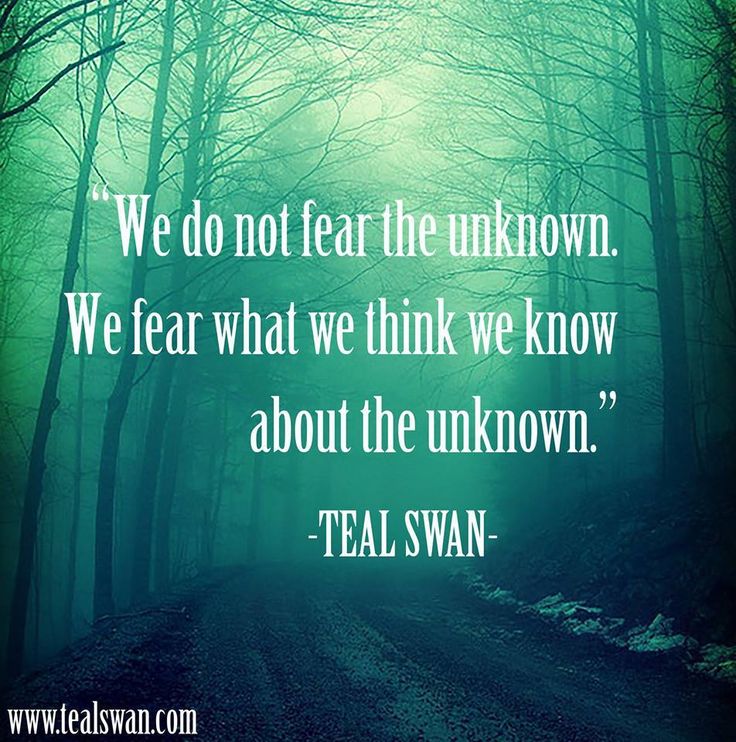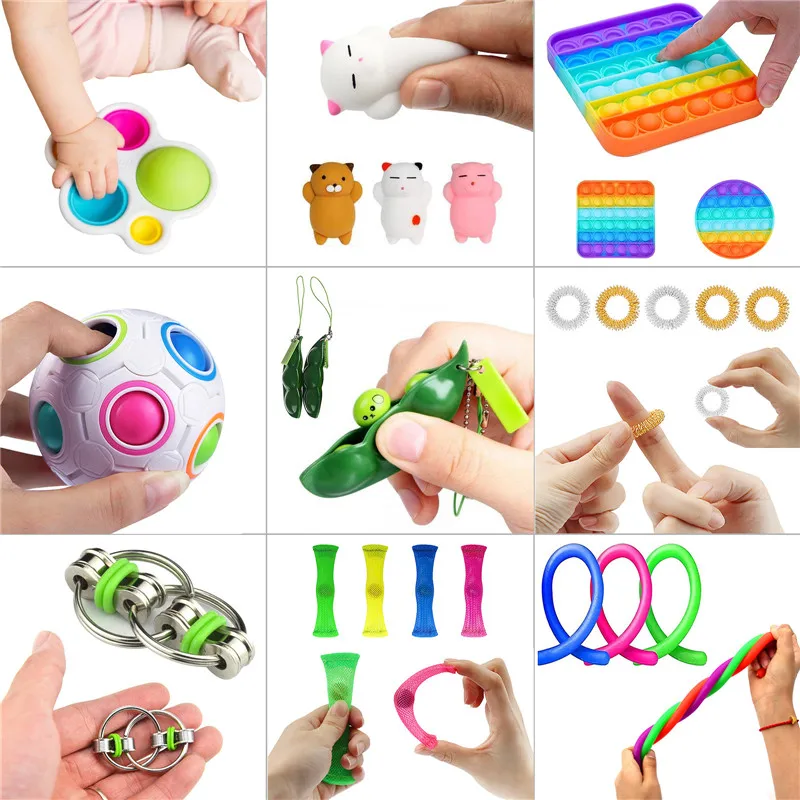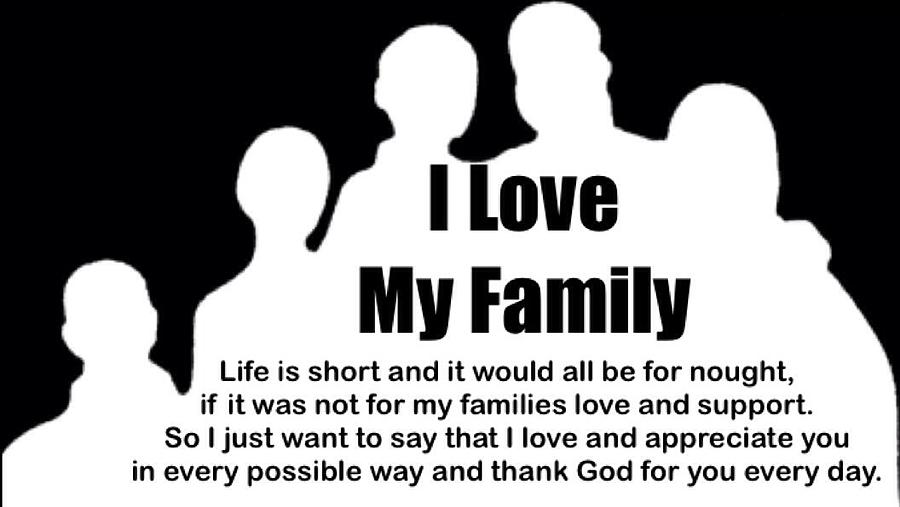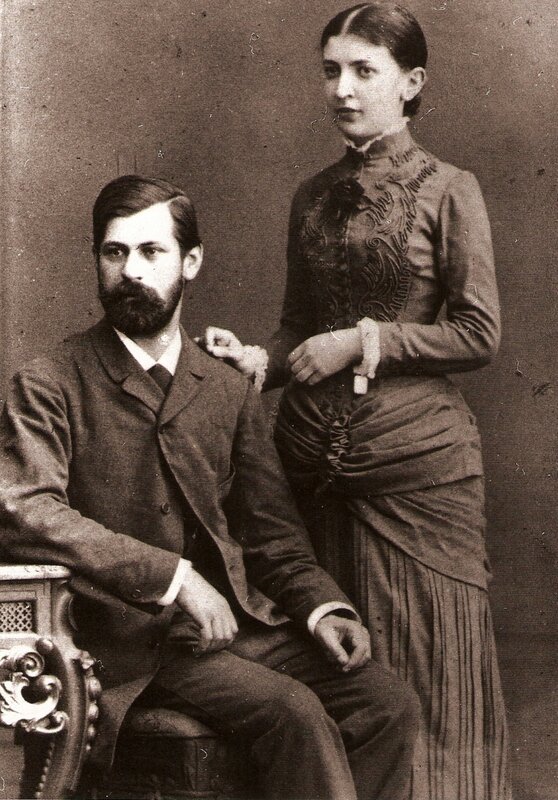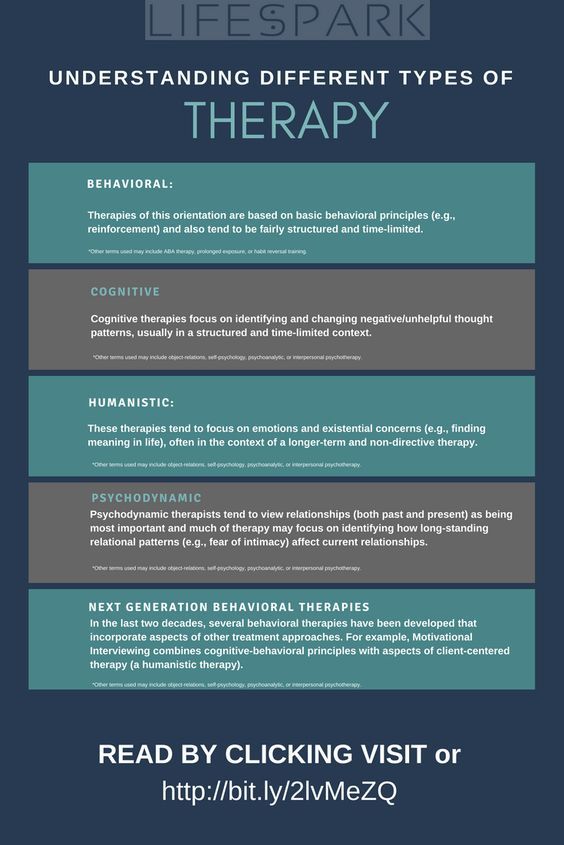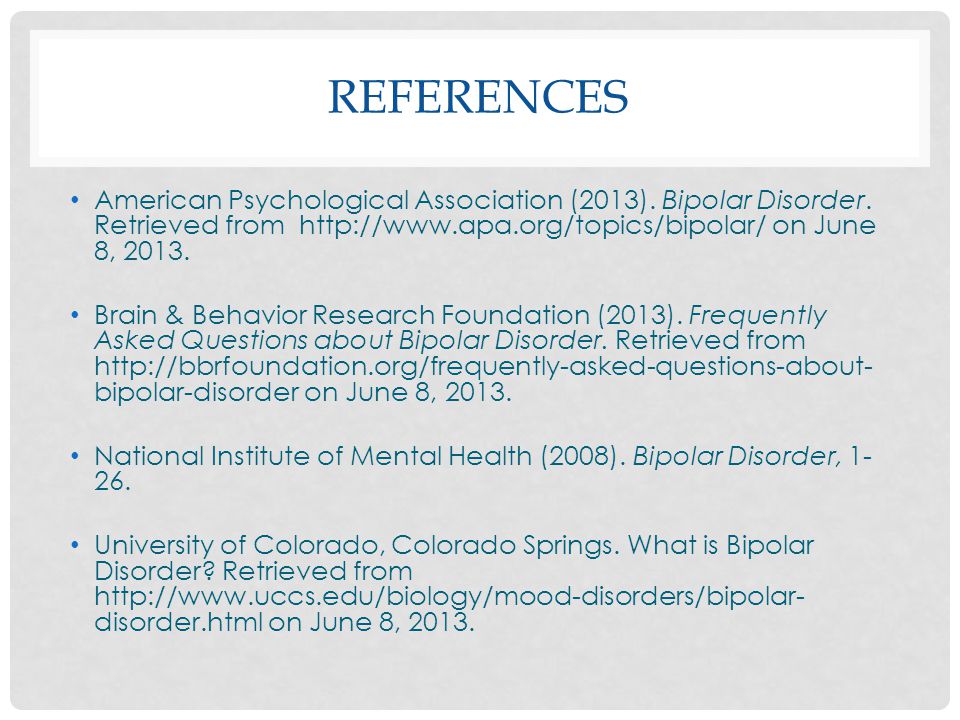Love versus infatuation
How to Tell the Difference So You Don't Waste Time or Energy on a Bad Thing
wellness
Infatuation vs. Love: How to Tell the Difference So You Don't Waste Time or Energy on a Bad Thing
By Jenna Birch
Published Oct 19, 2020
There’s a fine line between love and infatuation. According to Robert J. Sternberg’s theory of love, infatuation is rooted in passion; you’re wildly attracted to the person, you’re excited to see them, the sex is great, etc. Meanwhile, romantic love is rooted in both passion and intimacy; you have all the ingredients of infatuation, coupled with friendship, trust, support, etc.
Since infatuation is literally part of love, it might be hard to distinguish between the two—especially if you’re not sure you’ve ever been fully in love. But here are some signs to piece the feelings apart, and what I consistently stress to my coaching clients when they’re trying to figure out what’s going on—love vs. infatuation—in a given relationship.
If you badly crave being next to the person...it’s infatuation
I can typically tell when one of my clients is infatuated. She can’t stop smiling; she’s talking a ton about the sex; she’s giddy. And that’s great! It’s just not everything. Infatuation is rooted in passion, excitement and lust. It’s intoxicating. You might crave to be physically near the person as much as you can. But if they wouldn’t be your first call if you had a bad day, or you are afraid of burdening them with a problem, it probably hasn’t evolved into love yet.
If you feel safe around the person…it’s love
Love is patient, love is kind…you know the adage. With love, you feel completely supported. You feel able to open up about your deepest dreams and your darkest fears. When you’re with them, you truly feel their presence—not like they’re thinking about work, or might be talking to someone else online—and that presence is a comfort. A lot of clients, who are in love, will tell me they feel like everything is going to be OK when their partner is around. That is a very good sign.
That is a very good sign.
If you overthink the relationship, or wonder what they’re feeling…it’s infatuation
Love is two-sided. Infatuation, on the other hand, is frequently one-sided. If you’re infatuated, you might spend a lot of your time wondering about whether or not they’re super into you or committed to you. You might overthink the little things, like what to text them in the middle of a day, when they haven’t texted you yet. You might feel constantly insecure about whether or not they’re going to leave. If the tenor of your relationship is uncertainty, it’s not yet love.
If you know you could count on them in a crisis…it’s love
Let’s say your car broke down, or you found out a loved one was in the hospital. Would you call the person in question? If the answer is yes, and you know you’d be greeted with warm, supportive, comforting gestures, it’s love. If you feel like a crisis would be “too much” for the person to handle, it is likely infatuation. Love has depth to it, and it isn’t scared away by problems.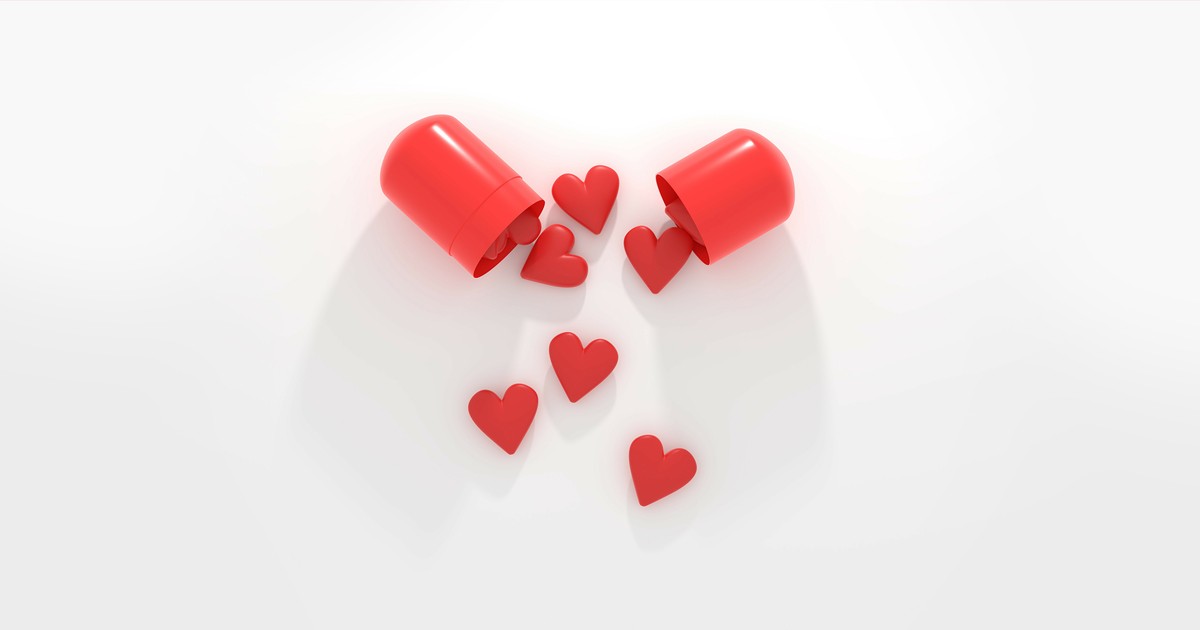 Love stays.
Love stays.
If your relationship is predominantly physical…it’s infatuation
Think about the time you’re spending with the person you’re seeing. Is sex a massive component of it? Would you (or they) rather hook up than go out? Do you spend time talking after you get physical, or does it feel hard to talk about “real things” outside the bedroom? Do you go on dates, meet friends, meet family, share in hobbies? Or must sex always be involved in all your get-togethers? Sex is great and important in any romantic relationship. But with love, it doesn’t feel like the central focus. It feels like a supplemental, exciting way to show you love your partner. When searching for the fine line, I always ask my clients whether sex is the main course or the side dish.
If your relationship is both sex + friendship…it’s love
We’ve all dated someone where we feel we could be close friends, but there’s no spark. The flip side of that is dating someone you can’t stop thinking about and can’t stop dreaming about, but there’s no emotional side to your relationship. What’s that phrase about love being friendship lit on fire? It is! With Sternberg’s theory, infatuation and passion is typically complemented by friendship and intimacy. So, if you don’t have both, you don’t have romantic love.
What’s that phrase about love being friendship lit on fire? It is! With Sternberg’s theory, infatuation and passion is typically complemented by friendship and intimacy. So, if you don’t have both, you don’t have romantic love.
What to do if you’re experiencing infatuation
I want to stress that infatuation is not a bad thing; it’s the starting point for a lot of great relationships. But both parties have to “do the work” to get to a place of love, and really be open to falling. If you’re not both on the same page, it will never evolve. If you want love, not just lust, then you just have to put the effort in.
1. Prioritize date nights, not sex nights
If your emotional relationship hasn’t evolved, take yourself out of an environment (aka at home) where you’ll be too tempted to get busy. Take a walk or go on a hike instead. Take a bottle of wine, and enjoy a picnic in the park. Go on a mini road trip together. Really put yourself in situations where conversation can evolve, and you can get to know each other.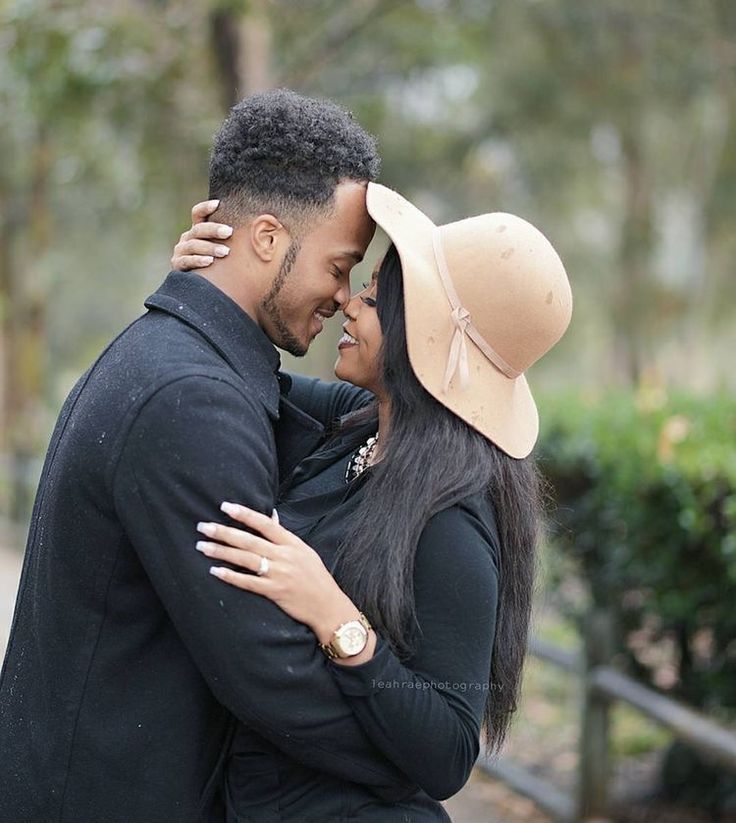
2. Ask probing questions
You need to get beyond the person’s day-to-day, and into the stuff of their dreams. If you’ve been dating for a while—at least a few months—you should feel free to ask where they see their life going, if they want kids, if they envision getting married one day, if they want to travel, what kind of life they want to have. This is how you see if you’re evolving in the same direction, and if you can complement each other along the way. It’s shocking to me how many people don’t ask the deeper questions, and end up wasting time with someone who isn’t in it for the same reasons (i.e. marriage, kids, commitment) that they are.
3. Talk on the phone
When I was dating, a weird sign developed among every person who was seriously invested in building a relationship with me: They’d call me on the phone. Hearing someone’s voice and sharing stories verbally, even when you can’t be physically with the person, creates far more of a bond and shows you’re committed to the work.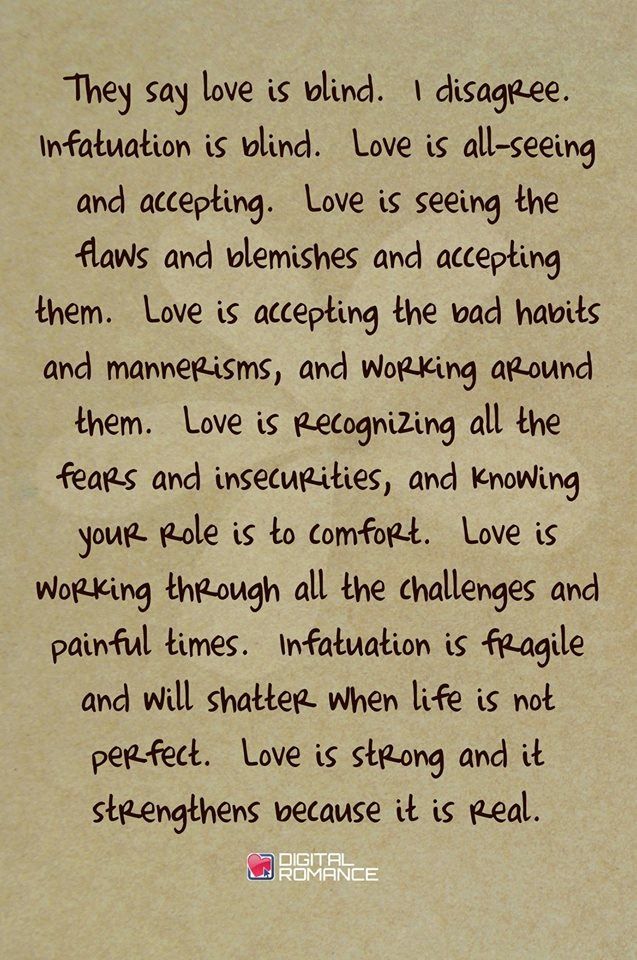 It takes ten seconds to send a text; it takes set-aside time to make a phone call. Prioritize it, and command it from your partner.
It takes ten seconds to send a text; it takes set-aside time to make a phone call. Prioritize it, and command it from your partner.
If you’re looking for love, don’t waste time on someone who is all about infatuation. Make sure you’re seeking out, creating and fine-tuning a friendship right alongside the passion you feel for them.
Infatuation vs. Love: 19 Differences + Signs Of Each
What is infatuation?
Infatuation is a strong feeling of attraction, fascination, and fixation toward someone, often without actually knowing them that well. Although it often feels very intense, infatuation tends to be based more on physical attraction and an imagined fantasy about who this person is, according to Lauren Fogel Mersy, PsyD, psychologist and AASECT-certified sex therapist.
"When I think of infatuation, I think of someone who has a strong attraction to a person they don't know well," Fogel Mersy explains. 'It can also involve rejecting information that goes against the fantasy, such as ignoring red flags or early signs of incompatibility.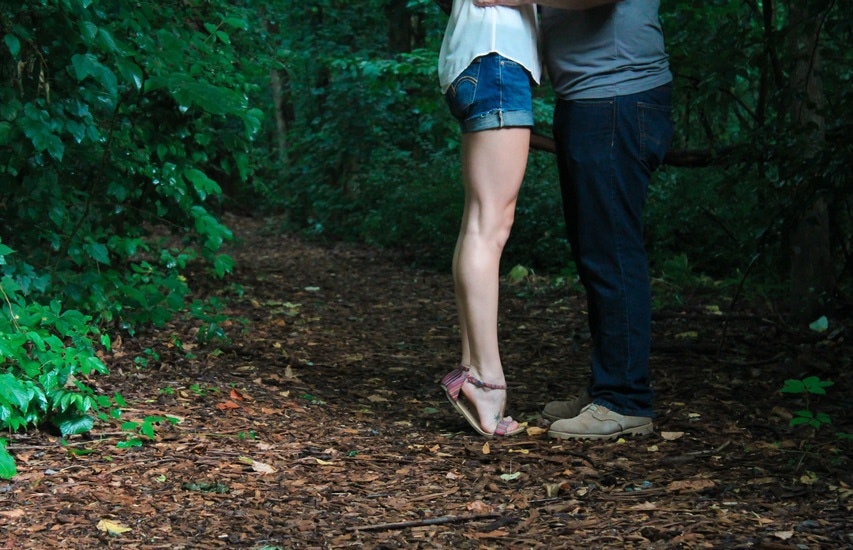 "
"
Someone who is infatuated is constantly thinking about that person, Fogel Mersy adds. The feeling tends to form very quickly after meeting someone, says licensed mental health counselor Grace Suh, LMHC, LPC, and the infatuated person may feel like they've found "the one" even though they've just met them.
Signs of infatuation:
- You're constantly thinking about this person.
- You haven't had that many real interactions or deep conversations with each other yet, yet you already have strong feelings for them.
- You feel like this person is basically perfect, or the "ideal" partner.
- You feel like this person is a "perfect match" for you.
- You feel vaguely "obsessed" with this person.
- You're very physically attracted to this person, and it can sometimes distract you from exploring other facets of this person.
- You don't know the person that well on an actual personal level.
- Most of what you know about the person is surface level, based on appearance, or based on their behavior in a group setting.
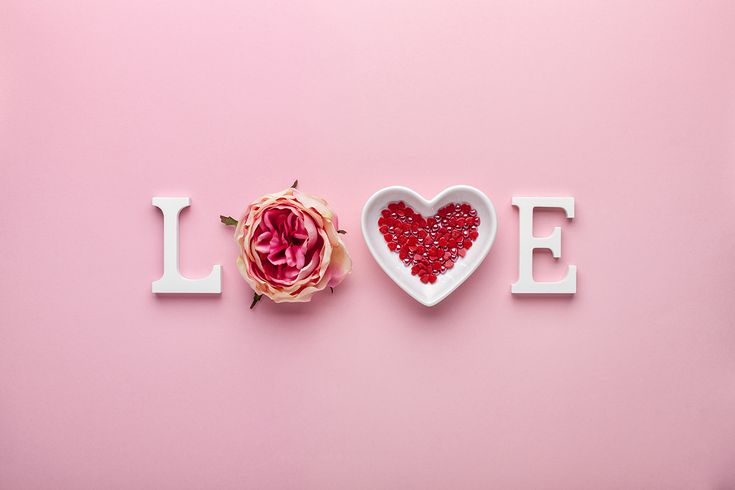
- Most of what you know about this person is the same stuff that any acquaintance might know about them.
- Most of what you know about the person is from hearsay or social media, not from actual conversations or experiences you've had with each other.
- You fantasize about this person, despite not knowing them on a personal level yet.
- You feel a little disappointed when the person doesn't meet your expectations, or you shrug it off as just a fluke.
- You ignore early signs of incompatibility that go against your fantasy.
- You're very concerned about impressing this person and having them see you in a positive light.
- You are overjoyed by the idea of "having" this person or being "chosen" by them.
- You're forming strong feelings for this person very quickly—almost as if you knew instantly.
- Everything is moving super quickly, and you're hitting (or wanting to hit) relationship milestones as fast as possible.
Advertisement
This ad is displayed using third party content and we do not control its accessibility features.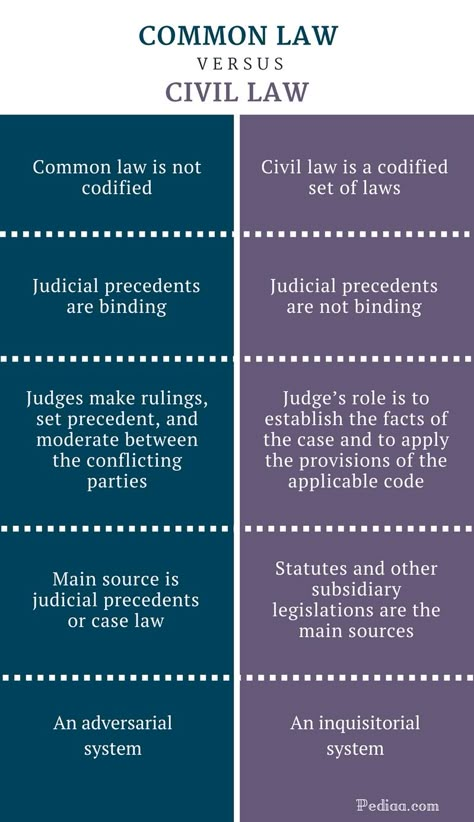
Infatuation vs. love.
Whereas infatuation tends to happen very quickly and involves a strong attraction, love is a much deeper experience of knowing someone fully, feeling bonded and close to them, and caring about them in a way that's both enduring and not centered around how they make you feel.
"Love is more than just a feeling," Suh says. "It requires some knowledge about the person and being able to love despite knowing that their loved one is flawed and imperfect. Love is not self-serving but the willingness to sacrifice and/or compromise."
Fogel Mersy puts it this way: "Loving someone means knowing them. Love is a form of intimacy, and intimacy requires being known and seen."
Does infatuation turn into love?
Infatuation does not always turn into love—sometimes it stays that way until the relationship comes to a close, either because the object of infatuation fails to live up to the fantasy or because they don't reciprocate the feelings. That said, infatuation can turn into love sometimes.
That said, infatuation can turn into love sometimes.
"Infatuation may turn into love if you are able to accept the disappointment and willing to give rather than self-serve," Suh explains. "Infatuation is self-serving because you feel good fantasizing about the person, but the reality is that this person who you think is perfect is probably not perfect. If you are able to give, sacrifice, and compromise with the person you are infatuated with [with] joy and willingness, yes, it can certainly turn into love."
Advertisement
This ad is displayed using third party content and we do not control its accessibility features.
How long does infatuation last in a relationship?
Infatuation usually happens immediately after meeting someone for the first time, Suh explains. But there's not really a set amount of time that it lasts in every relationship. Infatuation is most distinct in the "honeymoon phase" of a relationship, which lasts a few weeks for some couples and a few months or even years for others.
Rather than thinking about how long the infatuation stage might be, Suh recommends considering how long it takes to progress to the next stage of the relationship. (Here's more on how long it takes to fall in love.)
Is infatuation a bad thing?
Infatuation is not necessarily a bad thing, according to Fogel Mersy. "It just requires getting to know someone more intimately for it to grow into love."
But infatuation can be unhealthy in extremes, Suh notes. "When you are infatuated, it probably means that you really like their appearance and [feel] sexually/physically attracted to them intensely. It is important to have sexual/physical attraction toward someone to develop a romantic relationship," she says. "But if infatuation becomes an obsession with unrealistic expectations and demanding perfection, yes, it becomes bad."
Advertisement
This ad is displayed using third party content and we do not control its accessibility features.
The bottom line.

Infatuation can be a normal part of the early stages of getting to know someone or of a new relationship. It feels very intense, which is why many people confuse infatuation with love (just like they do love and lust). Infatuation can also be present in the process of falling in love, and in healthy amounts, it's not necessarily a bad thing.
"If infatuation turns bidirectional, with the sense of security from both parties, you're off a good start," Suh says.
Just remember to take your time, really invest in getting to know the person you're with—flaws and all—and maybe wait until the rose-colored glasses come off before making any big decisions.
Advertisement
This ad is displayed using third party content and we do not control its accessibility features.
5 Tips for Telling Love from Infatuation - HEROINE
When you're feeling intense romantic feelings, it can be hard to tell true love from falling in love. But there is a big difference between them.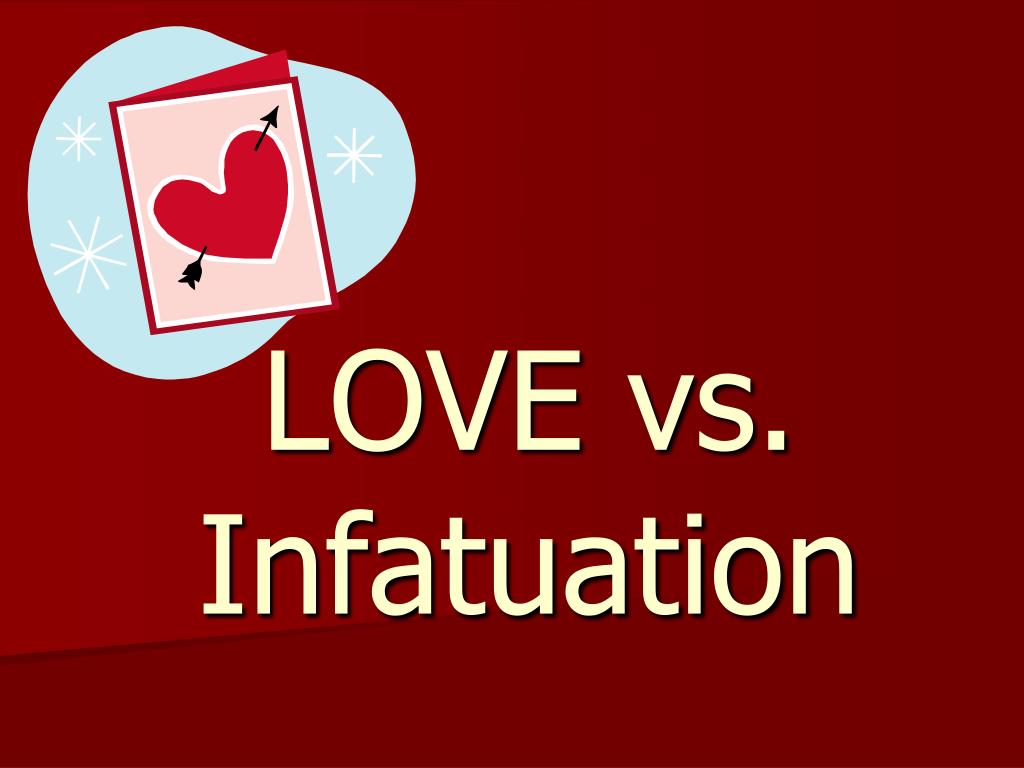 How to understand what distinguishes love from a simple hobby, you will learn further.
How to understand what distinguishes love from a simple hobby, you will learn further.
1. Think about whether you accept your partner's shortcomings
Being in love is an emotion that makes your partner seem perfect in everything. But when the rose-colored glasses fall off, it turns out that the partner has a number of shortcomings that you did not notice before.
Ph.D. Megan Flemming from the USA notes that when it comes to true love, people see a partner as imperfect, but at the same time accept his shortcomings. She says:
When you feel tenderness and affection for someone imperfect, that is love.
Nevertheless, it is worth noting that there is a big difference between accepting a partner's shortcomings and justifying abusive or toxic behavior. For example, it is quite possible to put up with his habit of leaving a mug near the computer or dislike for correspondence. But phrases that are gaslighting, manipulation, passive aggression and other manifestations of inappropriate behavior in a relationship should not be tolerated.
2. Rate your willingness to empathize and empathize
In a 2005 study published in the Journal of Comparative Neurology, scientists wanted to find out what the relationship was between love and empathy. It turned out that it is an integral part of a deep feeling.
It also turned out that when falling in love, a person is less likely to focus on determining the feelings of a partner. And people who experience love care more about the emotional well-being of the person next to them.
And in 2011, the German psychologist Tobias Esch conducted his study, which once again confirmed this theory. He determined that there is a neurological link between empathy and deep romantic experience. The emotions that a person feels for a partner are closely related to the limbic system, which is associated with motivation and pleasure.
3. Understand how well you know your partner
Each person needs an individual amount of time to fall in love. Someone can do it at first sight, while others look at their future partner for a long time.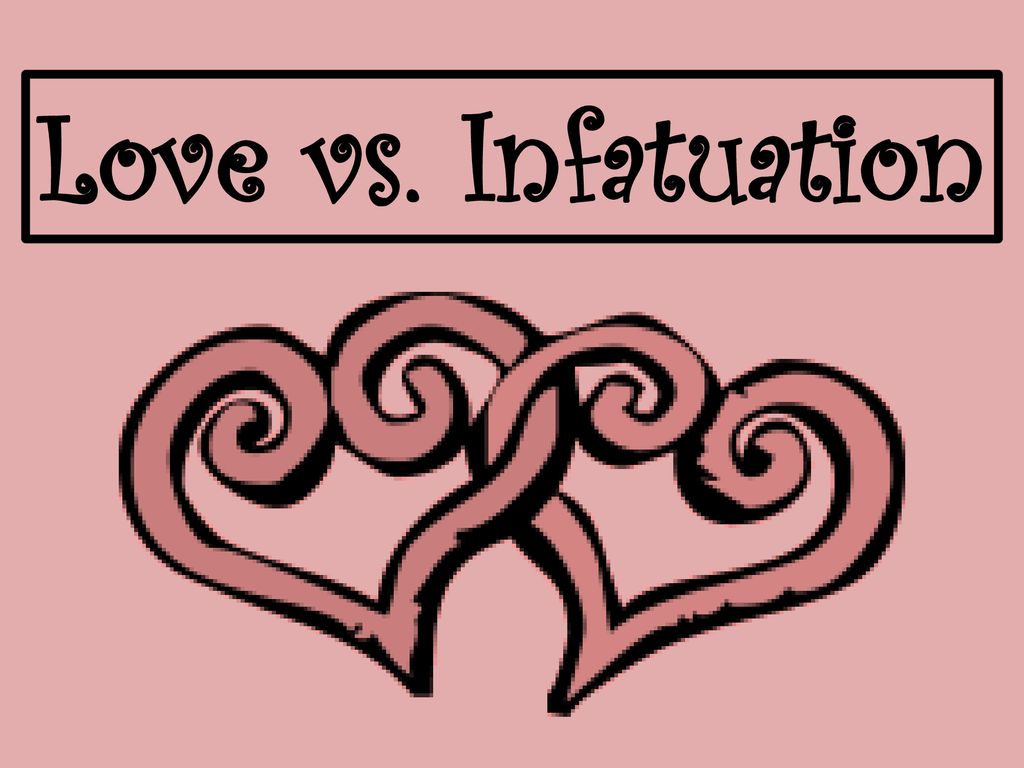
According to American clinical psychologist Megan Fleming, the difference between being in love and being in love is how well you know your partner.
When people are simply infatuated with someone, they tend to project their hopes and expectations onto the person they like. They hope that their guesses will be justified, as they still did not know him enough.
And if a person has a deeper feeling, he will know about the personality, interests, values and other important aspects of the views and life of his partner. He has an idea of what character traits he has, how he reacts to certain situations and triggers, how much he can be relied upon.
In addition, a 2021 review of research published in the journal Frontiers of Psychology found that people who experience deep love and affection are united by a desire to learn as much as possible about a partner in order to better understand him.
4. Analyze how you think about the future together
Falling in love and fleeting infatuations are mostly focused on the present, not on the future.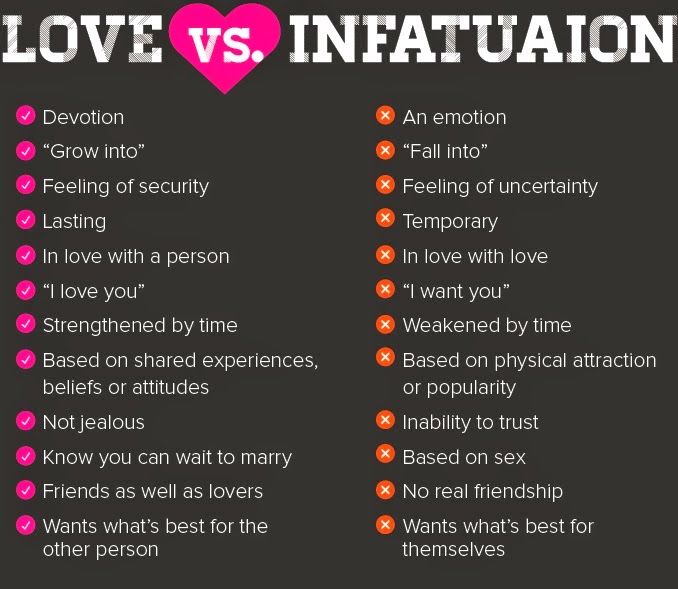 They focus on what you want now, but at the same time they can interfere with thinking about the future or making any plans.
They focus on what you want now, but at the same time they can interfere with thinking about the future or making any plans.
Yes, as soon as you fall in love, you can dream about what dress you will choose for your wedding and how many bridesmaids you will invite. But it is unlikely that such thoughts will have rational features, for example, thinking about the future family budget or other serious things.
A loving person thinks about the future together a little differently. He is focused not only on his comfort, but also on the well-being of his partner. In the case of a wedding, thoughts will definitely arise on how to make family life comfortable for both, whether views on housekeeping, raising children are combined, and also what compromises will need to be made in order to be happy.
5. Think about how confident you are in your feelings
Being in love is a feeling that can disappear as quickly as it arises.
For example, a person may experience romantic feelings when he is near a partner. But his emotions are dulled or completely forgotten when he is alone. Also, falling in love is often accompanied by doubts and worries about whether you really have sincere emotions for a person and how suitable he is for you.
But his emotions are dulled or completely forgotten when he is alone. Also, falling in love is often accompanied by doubts and worries about whether you really have sincere emotions for a person and how suitable he is for you.
And when a person truly loves, his feelings are not affected by circumstances or time.
Read Related: 7 Reasons Why Men Show Interest Then Suddenly Disappear
Add to Favorites
Share
Related articles:
LOVE VS LOVE - 21 FAIRY SIGNS
Attraction is a state that includes a series of feelings and sensations that make you feel intense attraction to another person. When you see someone and feel attracted. Not only physically. Where to put the hobby?
You can just stay infatuated even if you start dating this person.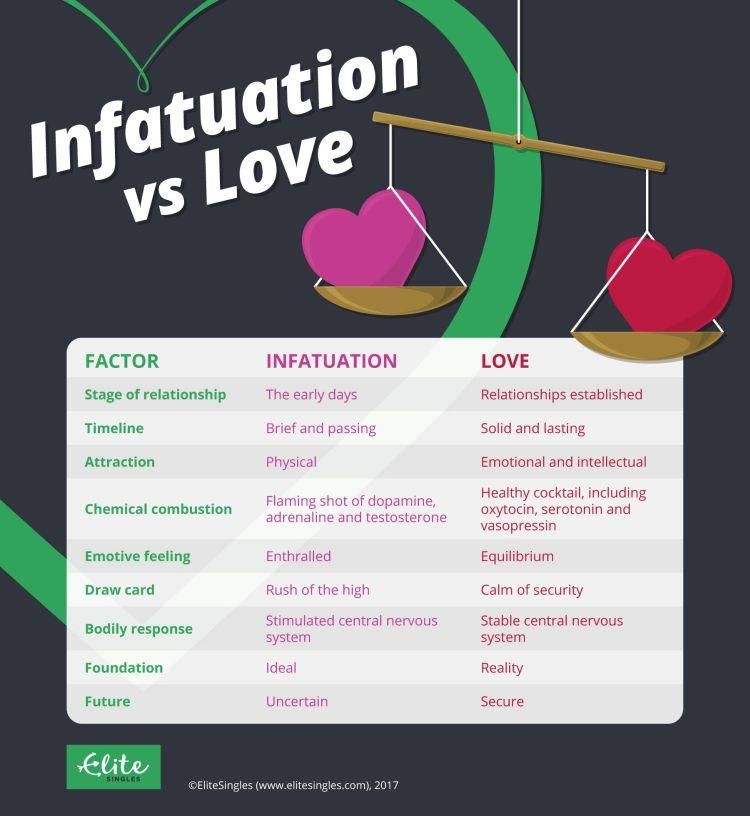 In this case, you will create wonderful relationships that will not develop into anything else. You can also go simple...nothing. In this case, the passion passes, and you stop loving this person. In other cases, on the contrary, fixation or falling in love can happen.
In this case, you will create wonderful relationships that will not develop into anything else. You can also go simple...nothing. In this case, the passion passes, and you stop loving this person. In other cases, on the contrary, fixation or falling in love can happen.
There are 21 signs of love and passion that will help you spot the difference.
- LOVE : An in-depth exploration of character traits, shared values, and common interests.
INFATUATION : Often based on meaningless adjectives, such as how a person walks or how they laugh.
- LOVE : Other properties observed in addition to the physical ones.
INFATUATION : It mainly depends on the physical attraction - the excitement that you experience when you touch another person.
- LOVE : Initiates what is best for you, personal development, self-esteem, ambition and striving for excellence.

INFATUATION : It often has a destructive effect on a person, making him forget the reality of life.
Further reading: The 10 most common mixed signals and how to deal with them- LOVE : It takes time to develop and mature.
INFATUATION : It often stops abruptly if you are not sexually active. If you are having sex, then this is not a trustworthy sign.
- LOVE : Recognizes values, but also less perfect ones.
INFATUATION : Often you idealize another person and do not want to admit that there are flaws in his character.
- LOVE : Provides approval from parents and friends.
INFATUATION : Often disapproved of by relatives and friends.
- LOVE : Can survive separation.
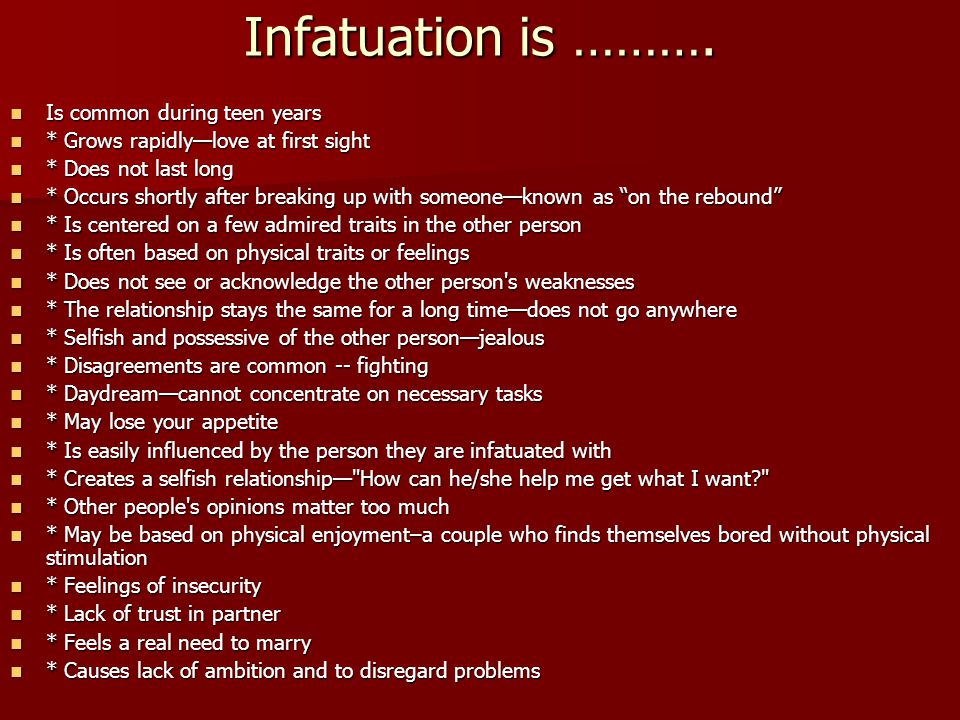
INFATUATION : Often "dies" when other people go somewhere.
- LOVE : Reduces tension in problem solving conversation.
INFATUATION : He is characterized by frequent quarrels, discussions and misunderstandings.
Further reading: When to give up a relationship- LOVE : A person is ready to share and give happiness and security to another person.
INFATUATION : More interested in what you can get out of this relationship.
how to deal with a manipulative person
- LOVE : Gain confidence and total security.
INFATUATION : Often contains strong and ordinary feelings of jealousy.
- LOVE : Usually this refers to the current situation.
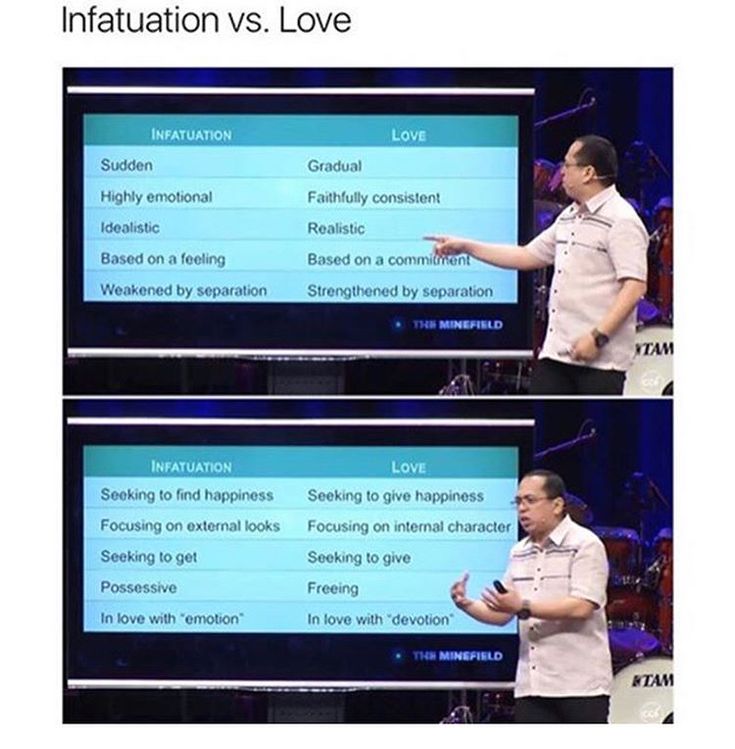
INFATUATION : Usually used to describe past relationships.
- LOVE : A feeling of trust and security is characteristic of love.
INFATUATION : Feelings of guilt, insecurity and despair often arise.
- LOVE : Over time, it grows and develops with emotional and biological maturity.
INFATUATION : This is more common among young teenagers and immature people.
Further reading: 8 tips to keep your relationship alive- LOVE : This will not happen soon after the end of the previous relationship.
INFATUATION : It may seem easy right after the end of a previous love relationship.
- LOVE : This gives you a constant sense of interest and joy in your community.
INFATUATION : When sexual excitement disappears, it is most often accompanied by boredom.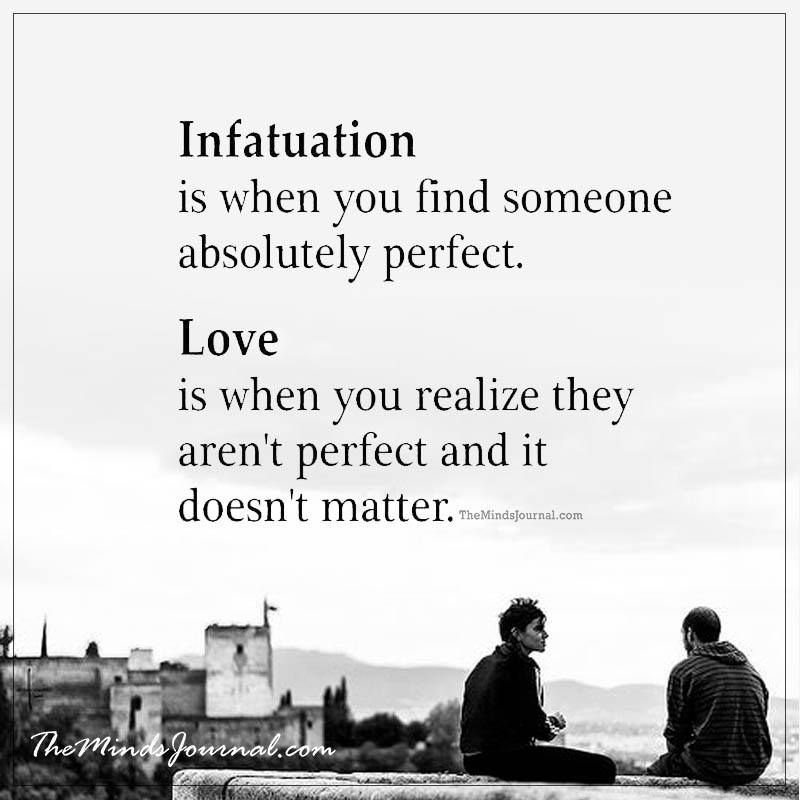
- LOVE : Increases mutual interest and desire to participate in joint activities.
INFATUATION : The couple is preoccupied with outdoor parties and entertainment.
- LOVE : He changes and gets deeper.
INFATUATION : This slightly changes the form of your connection, although you have been together for a long time.
- LOVE : The more you share your life with your loved one, the more intimate and emotional an atmosphere is created.
INFATUATION : This is often accompanied by small feelings that "excite".
Further Reading: 10 Toxic Behaviors That Can Ruin Perfect Relationships- LOVE: It tends to be protracted.
INFATUATION : This often takes very little time.
- LOVE : Protects, strengthens and cares for the other person.

